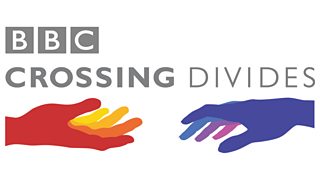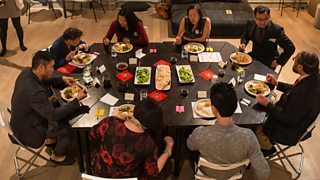
In the week of 23 April, 主播大秀 News is presenting a global season looking at the ways in which people connect across the fractures that divide societies - fractures between people who believe in different politics, religion or of different races, classes or ages. Emily Kasriel, who is leading the season, explains why the 主播大秀 is running this Crossing Divides season, how it showcases solutions-focused journalism, and shares some of her highlights to look out for.
We are frequently bombarded with news stories which feature tension, aggression and even conflict between different religious groups and races, the haves and the have nots, the young and the old, insiders and outsiders. Both in the UK and across the world it seems that and .
Despite the internet’s ability to connect us with people outside our community, the reality has been more constrained. We often filter out those who don’t share our values, people who we define as outside our tribe, leading to our digital lives becoming ghettoised inside our respective echo chambers. Google provides search results tailored to my interests and my social media feeds are calibrated to offer a personalised set of stories, cossetting me in my very own ‘filter bubble’ from encounters with others who think differently. Facebook, the most popular social media, uses more likely to feature polarised stories, which incite more passion and engagement.
A fragmented world creates multiple problems. Crossing Divides is looking for solutions, uncovering stories of how different individuals and communities are coming together across these lines to engage with one another, building on part of the 主播大秀’s public purpose to . Focusing on solutions rather than just problems is at the heart of the initiative which I lead across 主播大秀 News, both in the UK and internationally. We know that audiences are interested to find out about how problems that they are facing are being tackled elsewhere, and with correspondents on the ground in more locations than any other news organisation, we are uniquely placed to discover and tell these solution stories. Also, more is providing evidence that a surfeit of bad news is one of the most significant reasons that more of us are becoming news avoiders.

A meal in San Francisco brings together Chinese-Americans who support Trump and those who are vehemently opposed to him
Crossing Divides will be featuring a myriad of stories across 主播大秀 News outlets, on TV, radio, and digital. Today is reporting from a school in Turkey to find out why local parents are choosing to send their children to a school with a high proportion of Syrian refugees. A 主播大秀 Chinese reporter sits down for a meal in San Francisco with Chinese-Americans who support Trump and those who are vehemently opposed to him. Can they hold a meaningful conversation? Our Indonesian Service meets two former child soldiers, one Muslim one Christian, who had each killed and mutilated in inter faith violence. After swapping blow by blow stories of their crimes, they are gaining a new type of respect as peacemakers, holding interfaith hip hop concerts on a still tense island. 主播大秀 News at Six is finding out about the impact of the National Citizens Service scheme in the divided UK town of Rotherham. Can relationships formed by the young people survive beyond the few weeks of group activities? Also, The Real Story With Carrie Gracie on the World Service is recording a discussion in front of a theatre including many international students to explore which solutions are most successful in bridging the divide of age.

Ronald and Iskandar two former Indonesian child soldiers who were enemies
Crossing Divides comes a year after we first worked with the whole of 主播大秀 News to draw on a solutions framework to tackle another big challenge - air pollution. featured stories from the micro, in your own home, to . 主播大秀 journalists working for programmes such as to , from to investigated ways of tackling this significant challenge to us all.
As with SoICanBreathe, Crossing Divides is not a campaign. The 主播大秀 is not endorsing any particular solution to fragmentation nor advocating integration, but offering an opportunity to hear from those who are bridging divided communities, and to share the recipes that they are using to bring people together. We want to know what makes an encounter work as well as the limitations of any dialogue solution. Will a change in attitudes last? We are not implying that power relations can be equalised by an encounter, nor judging a successful encounter by whether both sides end up agreeing. It may be more important to have an opportunity to just listen to the other side.
Data is an essential tool of solutions-focused journalism, and so we are kicking off the season with an Ipsos Mori Poll. People in 27 countries are being asked to rate how tolerant their country is, and to identify which groups they trust the least - perhaps someone younger, wealthier, or who has a different political belief.
As part of the season, we are also offering audiences tips on how to have encounters with those who are different to us via interactive comics pioneered by working with 主播大秀 World Service. Audiences can pick a character on one side of a debate, for example the right to carry guns in the USA, and try different responses in order to elicit a meaningful dialogue, with bespoke illustrations every step of the way and bespoke feedback.
Crossing Divides has taught us about the multiple ways that people are creating encounters, and the tough personal journeys that they have taken to really listen to ideas which may challenge their fundamental beliefs. We are looking forward to hearing stories from our audiences about their own encounters, using the hashtag #CrossingDivides and plan on featuring the best of these on our website.
